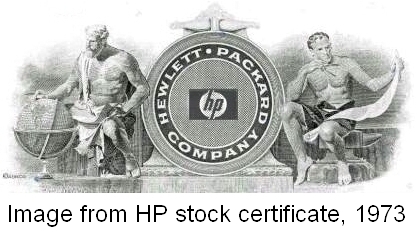Paper Stock Certificates (also referred to as "share certificates.") (Page updated Feb 24, 2026) Not officially endorsed or supported.
This page gives details for only one aspect of the many HP/HPE-related stocks. Due to the sequence of spinoffs and acquisitions, you may now have shares of HPInc (HPQ), HPE, DXC, Keysight (KEYS), and/or Agilent (A) – in different accounts – and may not have received cash payouts for Micro Focus (MFGP) and Perspecta (PRSP). Transactions were often tracked and reported differently – or not at all. Only you – not the company, plan administrators, transfer agents, brokers, or the IRS – can reconstruct your full employee stock history.
Start here: HP/HPE-related stock
Question? Email us: info@hpalumni.org
Overview of stock certificates.
An article on the "Investopedia" investor education and news website
covers:
- What is a share certificate?
- Decoding the information on a share certificate.
- What are my old share certificates worth?
- What do I do if I lost my original share certificate?
- If stock certificates are transferred on death, what is the tax?
https://www.investopedia.com/terms/s/share-certificate.asp
From that article:
"Never just throw away your old share certificates. They can still be worth something. Here are a few steps you can do to help determine their value:
- Contact your Stock Brokerage to look up the share certificate's CUSIP number. [If there is no CUSIP number on the certificate.]
- Figure out whether the company is still publicly traded. [The HPAA has that information here: HPAA Stock Decoder ]
- Call the share certificate's transfer agent (the agent should be listed on the certificate.)"
HPAA advice:
Your HP, HPE, and spinoff stock was probably not all held in one place.
Alumni have reported two steps that should be followed when dealing with paper stock certificates:
1. Contact the transfer agent.
Every company that issues stock has a Stock transfer agent that the company pays to keep track of all the shares. The point of contact is the transfer agent, not the company.
Dividend payments and stockholder communications are sent the address on file with the transfer agent. Your employer does not update that address for you. (More on transfer agents: Where's my stock? )
The transfer agent should be able to tell you what happened with that lot of stock. (If transfer agent is not named on the certificate or can't be reached, see HPAA Stock Decoder )
It is possible that the shares were cashed out by declaring to the transfer agent that the certificate was lost. In that case, this would have been done: "Purchase an indemnity bond to protect the company against the chance that the lost certificate may be presented at a later date." https://www.investopedia.com/terms/s/share-certificate.asp
2. Check for unclaimed property.
To check for lost stock and uncashed payout or dividend checks: Unclaimed Property
Keep address current on every financial account. Run easy unclaimed property search every year.
Employer does not update your address.
Neither cashing dividend checks, receiving direct deposits, online access, nor receiving statements prevents inactive accounts from being turned over to the state – only a personally-initiated transaction, postal
response, or call. Difficult to retrieve money; stock is sold.
Unclaimed Property
A copy of the certificate should serve as proof of ownership.
If you have stock records or paper stock certificates for a predecessor or successor company: Agilent (A) Autonomy (AUTNF) Compaq (CPQ) DEC (DEC) DXC (DXC) EDS (EDS) Juniper (JNPR) Keysight (KEYS) Micro Focus (MFGP) Perspecta (PRSP) Plantronics (POLY) Tandem (TDM) Other Predecessor Companies
 ("The engraving is
not one of Dave and Bill setting out to conquer the world. New York
Stock Exchange rules call for two human likenesses on every stock
certificate. The idea is that such artwork is difficult to forge. The
artwork was selected from designs approved by the NYSE." --Measure
magazine, March/April 1983.)
("The engraving is
not one of Dave and Bill setting out to conquer the world. New York
Stock Exchange rules call for two human likenesses on every stock
certificate. The idea is that such artwork is difficult to forge. The
artwork was selected from designs approved by the NYSE." --Measure
magazine, March/April 1983.)
Helping each other with life after Hewlett-Packard, HPInc, and HPE. Join independent HP/HPE forums
Independent, member-supported volunteer association. Not officially endorsed or supported. ©2026 Hewlett-Packard Alumni Association, Inc. By using this site you accept these terms.
